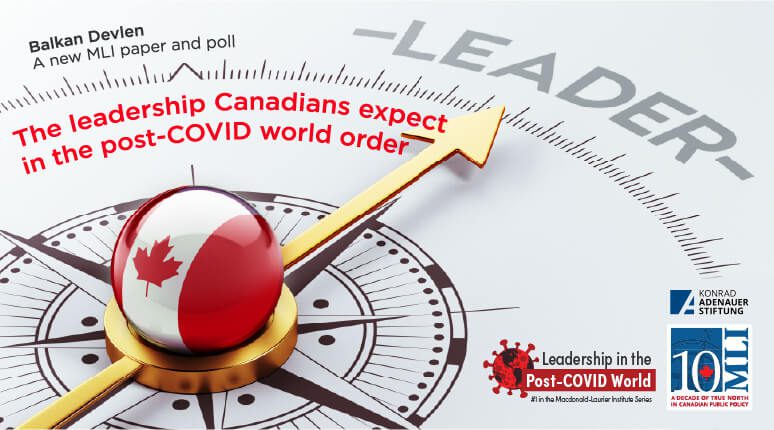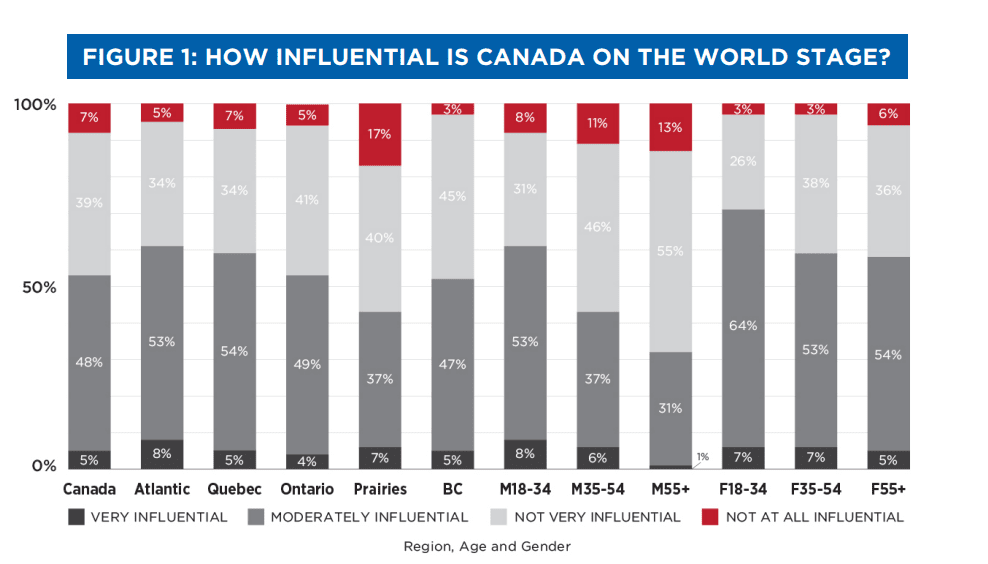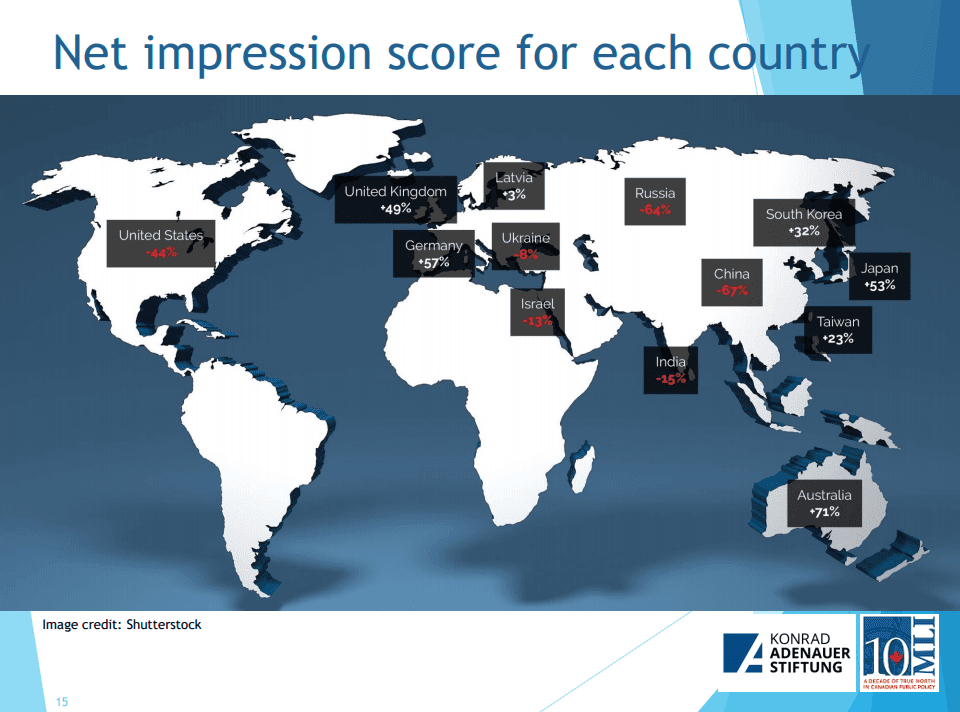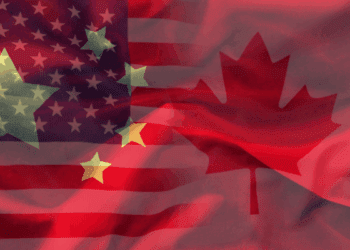 OTTAWA, ON (November 16, 2020): New polling conducted on behalf of the Macdonald-Laurier Institute finds that, not only do Canadians care about foreign policy, but they also have some strong opinions about Canada’s place in the world, our allies, and our adversaries.
OTTAWA, ON (November 16, 2020): New polling conducted on behalf of the Macdonald-Laurier Institute finds that, not only do Canadians care about foreign policy, but they also have some strong opinions about Canada’s place in the world, our allies, and our adversaries.
 These findings are the first segment of a three-part project on measuring Canadians’ views toward Canada’s place in the world. In an MLI commentary, titled “The leadership Canadians expect in the post-COVID world order,” Senior Fellow Balkan Devlen delves into the meaning of these polling results. The full results for part one of this project are available here.
These findings are the first segment of a three-part project on measuring Canadians’ views toward Canada’s place in the world. In an MLI commentary, titled “The leadership Canadians expect in the post-COVID world order,” Senior Fellow Balkan Devlen delves into the meaning of these polling results. The full results for part one of this project are available here.
A significant majority of Canadians (72 percent) believe that it is very important (22 percent) or moderately important (50 percent) for Canada to be influential on the world stage.
“Nearly three-quarters of Canadians believe that we ought to become more influential than we presently are,” notes Devlen. “This suggests that while Canada might not yet be ‘back,’ Canadians wish we were.”
The results reveal the most starkly-negative views among Canadians toward China recorded to date. Only 7 percent of Canadians hold at least moderately positive views toward China, whereas 73 percent of all Canadians have a negative view. Similarly, Russia is viewed negatively by 72 percent of Canadians.
“This study confirms yet again how out of sync the Government of Canada is with public opinion on China’s emerging threat to Canadian sovereignty and national security,” notes MLI Senior Fellow Charles Burton. “As a consequence, the credibility of Canada’s claim of principled commitment to the international rules-based order rings hollower and hollower as the years go by.”
 By contrast, Canadians held a more positive view of most developed democracies. Overall, countries like Australia, Japan, Germany, the United Kingdom, South Korea, and Taiwan are given high net-positive scores by Canadians. However, Taiwan also has high neutral scores, alongside Israel, Ukraine, Latvia, and India. This indicates that these countries have opportunities to improve Canadians’ views.
By contrast, Canadians held a more positive view of most developed democracies. Overall, countries like Australia, Japan, Germany, the United Kingdom, South Korea, and Taiwan are given high net-positive scores by Canadians. However, Taiwan also has high neutral scores, alongside Israel, Ukraine, Latvia, and India. This indicates that these countries have opportunities to improve Canadians’ views.
Overall, the polling indicates that Canadians prefer democracies to authoritarian regimes, with the average net score for all democracies measured reaching +19 percent, whereas the average net score for authoritarian regimes was -66 percent.
Yet not all democracies were viewed positively. In particular, Canadians expressed quite negative views (net -44 percent) of the United States. While the results of our poll indicate some softening among Canadians views when compared to polls conducted in 2018, the stark negative view toward the US persists despite the importance of the Canada-US relationship. This appears to be largely driven by public perceptions toward the Trump administration’s narrowly defined national interest agenda, and it remains to be seen whether the incoming Biden presidency will fundamentally change that.
“Modern American populism (of both the left and the right) is facilitating Canadian anti-American sentiments, despite the fact that this strategic relationship provides the bedrock for Canada’s national security and economy,” notes MLI Munk Senior Fellow Shuvaloy Majumdar. “For Canadians, overwhelming skepticism toward the American relationship will test how Canadian leaders balance this essential relationship with the need for self-reliance.”
Ultimately, the polling demonstrates that Canadians understand our power relative to other states, but believe that Canada should do more on the world stage. Canadians understand who our adversaries are, but many of our allies have opportunities to improve Canadians’ opinions. Most importantly, Canadians believe it is time for Ottawa to work alongside our allies and partners to advance Canada’s interests abroad.
To learn more about this polling, read the full commentary by MLI Senior Fellow Balkan Devlen, and check out the full set of facts and figures for part one of this project here.
***
This poll was done in partnership with the Konrad Adenauer Foundation. MLI also used the services of One Persuades for the polling. The survey was conducted nationally between September 28th and 30th, 2020, in English and French, and surveyed 1023 Canadians. The margin of error for the national sample is +/-3.1%.
Balkan Devlen is a Senior Fellow at Macdonald-Laurier Institute, Adjunct Research Professor at Norman Paterson School of International Affairs at Carleton University, and Superforecaster for Good Judgment, Inc.
For more information, media are invited to contact:
Brett Byers
Communications and Digital Media Manager
613-482-8327 x105
brett.byers@macdonaldlaurier.ca




